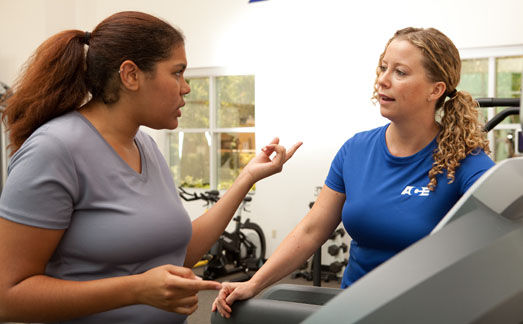
By Jonathan Ross
It may sound surprising, but many fitness professionals don’t have a clear understanding of why their clients exercise. And without knowing our clients’ true motivations, it can be a continuous struggle to keep them focused and motivated enough to stick with their programs or healthy lifestyle changes. With millions of Americans classified as either overweight or obese, sometimes connecting with clients and successfully helping them achieve goals goes far beyond exercise programming.
Consider, for example, a client who initially came to you with a goal of weight loss. She is now three weeks into her program and is dealing with major pressures at work and home, and as a result, she’s beginning to have trouble following her recommended exercise and eating plan. She arrives 10 minutes late for a session with you and says:
“I’m so sorry. I’m just overwhelmed at work and at home. I haven’t worked out the last few days and I’m upset because I haven’t lost much weight yet.”
Your response to this type of situation will often determine whether the client will overcome her current obstacles and continue progressing, or if she’ll continue to struggle.
Your goal as a fitness professional isn’t just to help your clients get in shape; it’s to discover how to transform their attitudes about exercise by tapping into the powerful emotional reasons behind why they want to get in shape.
Part of accomplishing that is to investigate why goals matter to clients. Why do they want to be fit in the first place? For too long, fitness professionals have focused on what someone’s goals are, when in fact it is more important to know why your client set those goals in the first place.
Returning to our previous example of the client who has lost motivation, digging a little deeper during your initial orientation would have revealed that, even though she said her initial goal was weight loss, she is actually motivated by a desire to be fit enough to play with her kids and enjoy recreational activities with her family. In fact, when she discussed a desire for a greater ability to play with her kids, you may have noticed that her tone changed and you heard emotion in her voice, revealing the power of the emotional shift that was also evident on her face.
Perhaps, for example, she mentioned that one of her kids’ favorite games to play is tag. With that in mind, during your sessions with her, you could create a fun variation on the game where, during active recovery, she chases you while you hop on one leg. Once she tags you, then you have to tag her while still only hopping on one leg. It becomes clear that the client loves this part of her sessions.
It’s also important that you take time to address your client’s frustrations—your response could be a powerful opportunity to motivate and inspire her to continue through a moment of frustration.
For example, a client-trainer conversation could go something like this:
TRAINER: “I understand that you’re frustrated right now with the lack of progress. Have you had a chance to do something active with your kids recently?”
CLIENT: “It’s funny you should ask. Last weekend, we had a family get-together and my kids wanted me to play tag with them and the other kids. I did so for a while and had a great time. It was only after I stopped that I realized I wasn’t nearly as tired as I normally would be doing after playing a game like that. And I’d been at it for longer than I realized!”
TRAINER: “That’s terrific! That is a clear sign your body is changing and getting more fit. If you can find a way to keep this good momentum going, you’ll notice that additional results will soon follow and you’ll be harder to catch when you play tag with your kids!”
Of course, this is just one example of how fitness professionals can inspire and motivate clients using the power of emotions and deeply held beliefs. To learn more about how you can enhance the exercise experience for your clients through a deeper understanding of their emotional drivers, register for the Effective Strategies for Training Obese and Overweight Clients Workshop.